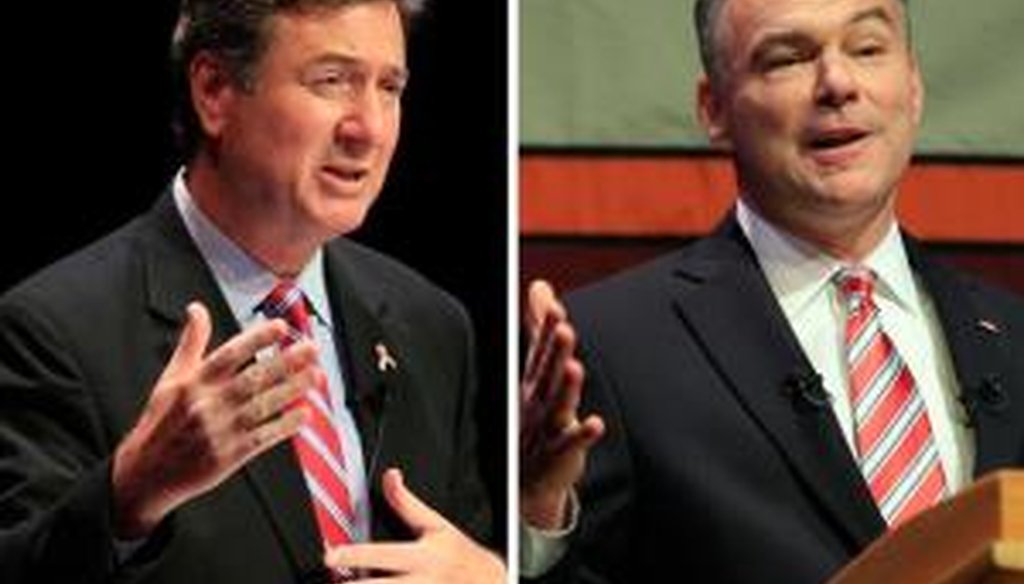Stand up for the facts!
Our only agenda is to publish the truth so you can be an informed participant in democracy.
We need your help.
I would like to contribute

Republican George Allen, left, and Democrat Tim Kaine have voiced little agreement on tax and spend issues.
PolitiFact Virginia on Thursday night watched the final U.S. Senate debate between Republican George Allen and Democrat Tim Kaine.
Many of their claims were familiar to us. Here’s a quick review.
Kaine: "I took tens of thousands of low-income Virginians off the income tax rolls."
As governor, Kaine signed a law in 2007 that gradually raised the minimum earning level for paying state taxes from $7,000 to $11,950 this year. For married couples filing jointly the minimum filing limit was raised from $12,000 to $23,900.
In a 2007 news release, Kaine said the measure would exempt 147,000 low income Virginians from paying state income taxes. An analysis by the Virginia Department of Taxation confirmed Kaine’s figures.
Allen: Says he "reduced the size of the state workforce by 9,000" as governor.
Allen was governor from 1994 to 1998. The number of full-time workers in the executive branch, controlled by the governor, was 111,540 in December 2003, according to the state Department of Personnel and Training. The number dropped to 101,450 in December 1997, a fall of 10,090 employees, or 9 percent.
If the legislative and judicial branches plus independent agencies are included, the number of state employees dropped from about 115,750 in December 1993 to 110,250 in December 1997, according to the state Department of Human Resource Management. That’s a drop of 5,500 or about 5 percent.
It should ne noted that under Allen, the state increased its reliance on private contractors, particularly in the Department of Transportation.
Kaine: when Allen was a senator health care "premiums for American families went up by 80 percent."
Allen was a senator from January 2001 to January 2007. The average premium for employer-sponsored family health coverage rose from $6,438 in 2000 to $11,480 by 2006 -- a 78 percent increase, according to the Henry J. Kaiser Family Foundation, which compiles an annual survey of employer health benefits. Adjusted for inflation, family premiums increased by 52 percent during Allen’s term.
Health insurance analysts we’ve spoke with have been dismissive of Kaine’s effort to pin rising premium costs on Allen. Alwyn Cassil, spokeswoman for the Center for Studying Health System Change, noted that in the late 1990s and the early 2000s there was a shift from Health Management Organizations to insurance plans that were less restrictive on the medical services patients could receive. As a result, people used more services, which helped lead to higher premiums, she said. Medical providers also raised prices for services, she said.
"Premiums went up, but the idea that one person is responsible for those things -- that’s boiling things down to the point of meaninglessness," Cassil said.
Allen: Says "over 300,000 new jobs" were created when he was governor and "over 100,000 jobs" were lost when Kaine was governor.
In February 1994, Allen’s first full month as governor, 2,952,300 people were employed in Virginia, according to the Bureau of Labor Statistics. When Allen left office in January 1998, there were 3,259,100 jobs -- an increase of 306,800.
In February 2006, Kaine’s first full month as governor, there were 3,713,500 jobs. That fell to 3,614,300 when Kaine left office in January 2010 -- a loss of 99,200 jobs
But Allen governed in good economic times while Kaine, in the final two years of his term, had to deal with a severe national recession. Economists repeatedly tell us that governors have a limited impact on their state economies and job creation; they get too much credit for the good times and too much blame for the bad times.
Kaine: Says repeal of Obamacare "only makes the deficit worse."
The Congressional Budget Office, in a July 24 letter to House Speaker John Boehner, estimated that repeal of Obamacare would increase deficits by $109 billion over 10 years.
Here’s the CBO’s math: By repealing the law, the government would save $1.171 trillion in expanded health care costs. But it would lose $1.28 trillion in savings -- $711 billion in health care efficiencies demanded by the law and $569 billion in taxes and fees.
The CBO left itself wiggle room, saying it is difficult to predict how the Affordable Care Act will affect the budget. Contributing to the complexity, the agency said, is a June decision by the U.S. Supreme Court that allows states to opt in or out of Medicaid expansion.
Allen: The U.S. Senate hasn’t "passed a budget in over three-and-a-half years."
The last time the U.S. Senate passed a budget resolution was April 29, 2009. We are not quite to three and a half years later.
Democrats, who control the Senate, have claimed that the Budget Control Act of 2011 serves as the budget for fiscal years 2012 and 2013, which we just started on Oct. 1. The legislation included provisions to raise the nation’s debt ceiling and set caps on certain types of future discretionary spending for 10 years. But it doesn’t include the typical plan for federal spending that is characteristic of budget resolutions.
Our Sources
PolitiFact Virginia,"George Allen says ending Obamacare would save nation $1 trillion,"Oct. 11, 2012.
PolitiFact Virginia,"Not quite ready for the Truth-O-Meter,"Oct. 18, 2012.
Governor Tim Kaine,"Governor Kaine proposes legislation to allow property tax relief, raise tax filing threshold,"January 8, 2007.
Legislative Information System,"HB 3022,"January 22, 2007.
Virginia Department of Taxation,"Fiscal impact statement for HB 3022,"March 9, 2007.
Roanoke Times,"Governor signs bill offering tax relief and tax ‘holidays,’"March 22, 2007.
Richmond Times-Dispatch,"Kaine signs measure for low-income tax break,"July 4, 2007.
PolitiFact Virginia, "Allen says he substantially cut state government workforce as governor," Sept. 3, 2011.
PolitiFact Virginia, "Not quite ready for the Truth-O-Meter," Oct. 18, 2012.
PolitiFact New Jersey, "Congressman Leonard Lance claims the U.S. Senate has not passed a budget in more than three years," Sept. 12, 2012.
PolitiFact Ohio, "John Boehner says Senate Dems haven’t passed a budget in more than 1,000 days," April 26, 2012.










































